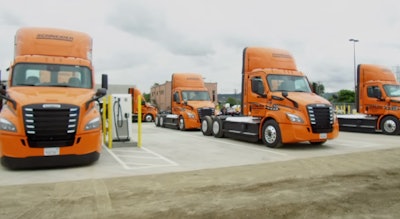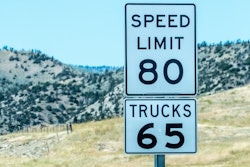
The California Air Resources Board's first real attempt to ban diesel trucks from hauling in the state recently got shot down, at least partially, in court. Fleets and owner-operators now might be left wondering if CARB's diesel drayage ban is dead, paused, or just lingering in the shadows until the next regulatory cycle.
A recent webinar from Edison Energy, a consultancy that helps companies electrify and decarbonize transportation needs, provided some answers and reference points on that front.
California sought to ban, as of January 1 this year, the addition of diesel trucks to its registry of drayage trucks. Other provisions in the Advanced Clean Fleets (ACF) rule would have restricted "high priority fleets," or fleets with more than 50 qualifying trucks or more than $50 million in gross revenue, to meet zero-emission vehicle (ZEV) procurement milestones starting next January. Those high priority fleets would also have to begin submitting paperwork on the makeup of their fleet to ensure they're hitting the milestones.
[Related: California 'not' dreaming: CARB year-end deadlines getting real for truckers]
Those bans never took full legal effect, however, as a lawsuit from the California Trucking Association derailed enforcement pending a waiver from the Environmental Protection Agency.
"Fleets can continue adding diesel medium and heavy duty" drayage trucks "to their fleets," said Iman Nordin, a senior analyst at Edison, "but keep in mind once the waiver is approved or EPA makes a determination that it's not required, those vehicles are at risk of not being able to operate in California" ports.
 Until EPA says so, none of this is enforceable.Edison Energy
Until EPA says so, none of this is enforceable.Edison Energy
CTA for now has opened a window for new diesel trucks to continue rolling in California's busy ports until an EPA waiver, or word that California doesn't need a waiver, comes down. However, Nordin said it is likely a matter of "when" not "if" a waiver is approved.
"The majority" of EPA waivers, he said, "generally are approved, but the timeline can take up to 18 months if not more." Nordin noted the most recent EPA waiver on this issue took 15 months.
Shannon Holzer, the lead of the policy team at Edison, said the EPA waiver decision could come "as quickly as 6 months," as the government is "in an election year," prompting a lot of agencies' rush to finish agendas "by mid-April."
As for the penalties a fleet would face if and when California does get the authority to enforce its ban, Nordin said CARB "doesn’t seem to have any financial penalties" in mind, and the risk is "more operational," with power units potentially locked out of ports.
Stranded trucks – or trucks suddenly deemed unfit for work in California ports – represent the worst of the consequences for continuing on with diesel, it seems, for now.
Due to the CTA's court victory, CARB will pause any enforcement action for now, Nordin said. That means the fleet makeup paperwork, originally due by February 1, isn't due just yet, though CARB still encourages fleets to voluntarily comply. Even with a lack of enforcement and a timeline on new regulatory clarity that could take years, Nordin and others at Edison encouraged fleets to continue their electrification journey.
 Put on pause for now, but the very first deadline here has already passed.Edison Energy
Put on pause for now, but the very first deadline here has already passed.Edison Energy
Because EVs need charging infrastructure that can take years to properly install, even a break in the regulatory pace doesn't buy a trucking company a lot of time.
There are many exemptions to the ACF rules. For example, if the EV OEM can't deliver the truck on time, document it, because that's an exemption, Edison Energy noted. If the power company can't get the juice to the chargers, that's another exemption, potentially buying more time. If the construction of charging infrastructure gets held up in permitting or for other reasons, that too grants fleets an exemption.
Ultimately, Edison felt, California's ZEV regs deadlines are coming for sure, gaps in enforcement policy not withstanding.










